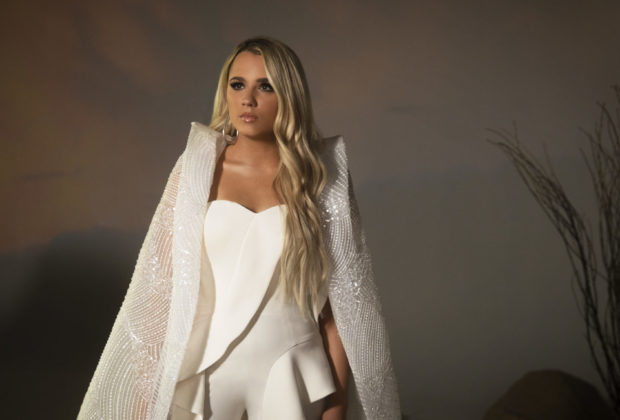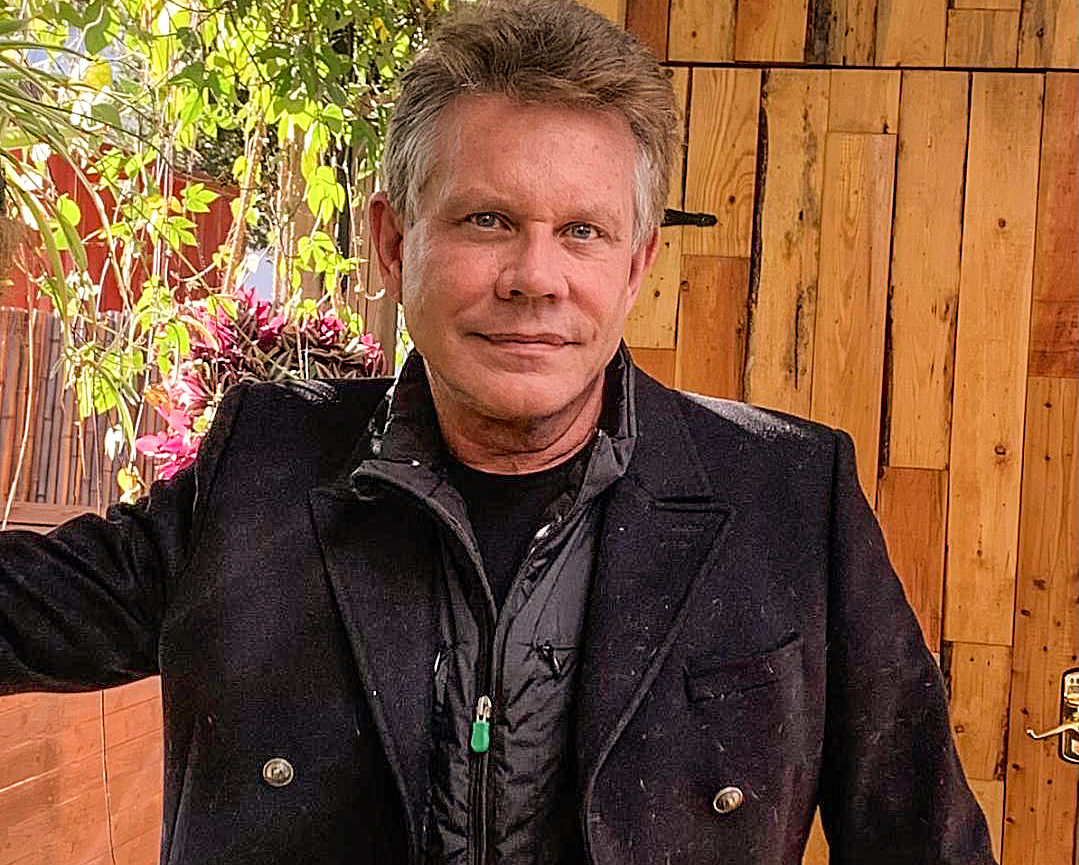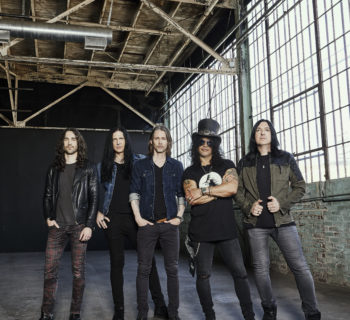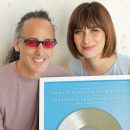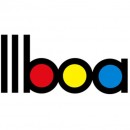For too many artists, the COVID era has resulted in stagnancy. Scrapped tours, delayed album releases, tabled plans. Musicians are not exempt among victims of the pandemic, which has stuck so many of them in a holding pattern.
Not so with 21-year-old Pennsylvania newcomer Gabby Barrett, who released her debut album, Goldmine, in June 2020 and watched its lead single, “I Hope,” go platinum five times thereafter. After finishing third on American Idol in 2018, the singer-songwriter locked in on her career––signing with Warner Music Nashville the following year––and her personal life, marrying fellow Idol contestant Cade Foehner in October of that year, before any lockdowns subsequently took hold.
Barrett, who started singing in adolescence, gave birth to her first daughter in January and is currently incubating her second album. Music Connection caught up with her in August as she was knee-deep in the new record and ahead of her appearances at summer music festivals including Rivertown Live in Minnesota and the iHeartRadio Music Festival in Las Vegas, and opening dates for Thomas Rhett and the Zac Brown Band.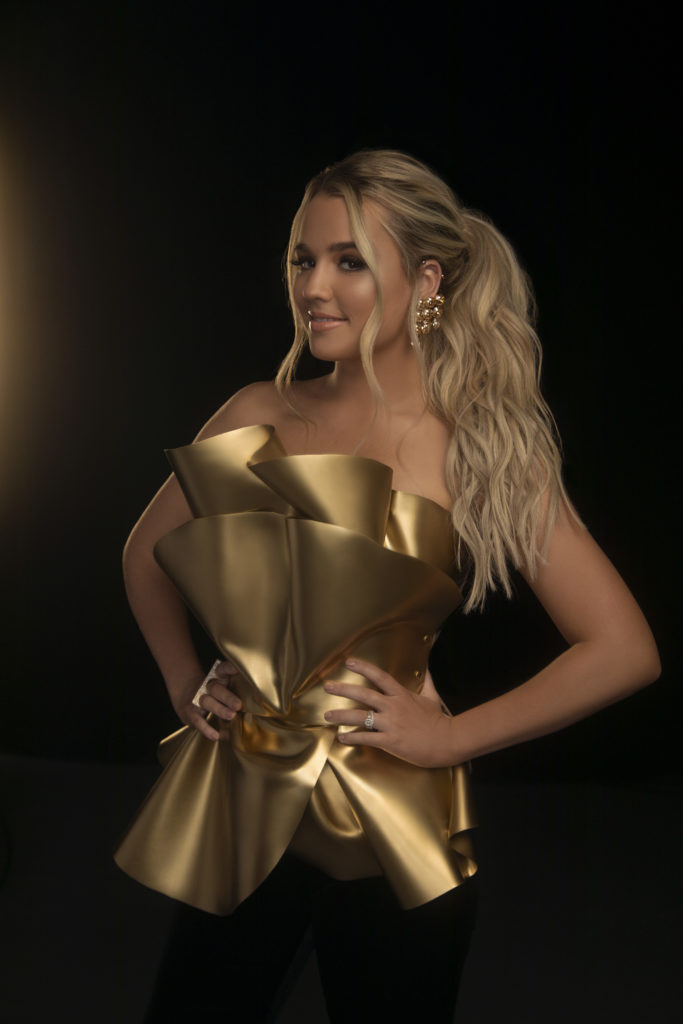
Music Connection: Hi, Gabby. How’s your day been doing?
Gabby Barrett: It’s quite rainy here in Nashville now, so that’s good. Right now I’m working on music for album number two. We’re writing and trying to get ready to try out the new songs for our upcoming shows.
MC: You have dates slated through early October. Are you hopeful you’ll be able to make them all?
Barrett: Oh yeah, definitely. I’ve been waiting a year and a half to get back at it.
MC: How was that year and a half? Or, as some people say these days, “How was your quarantine?” Was it anxiety-inducing? Did you focus completely on your music or on your family as well?
Barrett: It was a big blessing for me in a lot of ways. The best thing that came out of it was definitely my daughter. I got pregnant in May, and COVID had really just started to shut down everything in music in March. Of course, we were thinking of the challenges with being pregnant and having to be prominent everywhere. But thankfully, everything came out okay. And my daughter came out healthy. Our family was able to be together throughout the entire process of the pregnancy. So it was a good time to really just reflect and spend time with my family and reorganize priorities with everything.
A lot of my family is from Pennsylvania, my husband’s family in Texas, and we live in Nashville. So it’s not that easy to get around them all the time. It takes a 10-hour drive or a flight [to see family]. So it was nice to be able to spend time with them and just take a break. That was definitely a gift.
MC: Having all those professional and personal developments happening at the same time must have been exciting but challenging as well, especially at the beginning of a career. Did you talk with other artists who had a child at the same time as their first album had just come out?
Barrett: No, I don’t think I know somebody that had an album out and their child at that time. I talked to a couple of females and then I reached out to a country music friend. Being able to reach out to them if I ever needed any help with parent questions, the females have been awesome to me in that manner. And so I appreciate the advice that I’ve gotten from them.
MC: Given your explosive success at your young age, 21, is there any advice that maybe a veteran artist or maybe even a family member or friend has given you that that really hit home and stuck with you during these past couple of years?
Barrett: Carrie Underwood has been an awesome person [who provides] advice and friendship. She’s just been very kind to me since getting off American Idol. You can tell by her character and her kindness, even on camera, that she’s like that to everybody, which makes it even better [when she’s like that to you in real life]. She was somebody who I heard on the radio and saw on TV and enjoyed a lot [when I was younger]. She’s an amazing mentor for a range of men and women who look up to her. So, she’s been great.
MC: Are there anything specific pieces of advice she gave you that come to mind?
Barrett: I asked her about 80 questions, like what kind of stroller did [she] use and other things like that. I had a conversation with her, after I got off American Idol, how to kind of keep the ball rolling with things and how she did that. She said she is a really hard worker; she would write constantly and work on her music and just work a lot. I am somebody who is always willing to work, as well. I come from a home of hard-working families and hard-working parents. So that was kind of instilled in me from a young age. It’s something that I’m really willing to do, especially for a dream job like this. And so that’s exactly what I did: writing and working on days you would normally be off. I want to continue to work all the time, every day, and to be persistent with trying to persevere. And thankfully, now I am where I am. 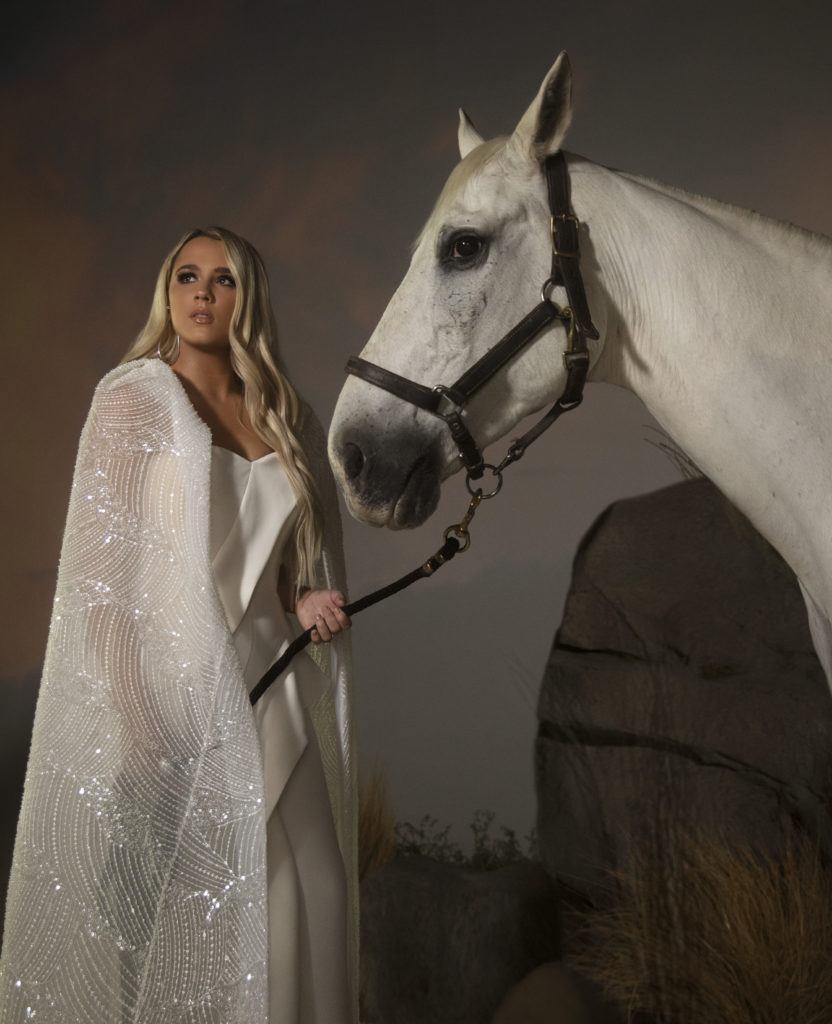
MC: You have seven siblings. Growing up in such a large household, was there friendly competition among you and your siblings? Did having so many brothers and sisters make you want to stand out more?
Barrett: I have five half-siblings and two immediate siblings. So everybody wasn’t in the house growing up when I did. And everybody’s kind of spread out in ages. But I was always thankful for the support and having as many siblings as I have. It’s fun trying to find Christmas gifts and having somebody to talk to and turn to for whatever reason. So my immediate siblings, my sisters––the one a year younger than me and my brother who is two years older than me—they were always on the road with me when I was growing up. I was on American Idol for seven years, and when I was performing they were all a huge support. I’m so very grateful for my siblings.
MC: Are you able to still see them often? Do they live close by?
Barrett: Yes, my brother does very much for me, and my sister is in cosmetology school to learn to be my stylist on the road.
MC: As you work on your second album, has your team grown since your first?
Barrett: Yeah, thankfully, my team has definitely grown. It first started out with me, my dad and my sister, and then transformed. I have record label [representatives], a manager, a lighting person, a monitor person, a merch person … so we have a nice little team of people who are just awesome.
MC: You played 136 shows in 2017, before you were crowned third on American Idol the following year. At that point, who was involved with your career? Was it mostly you and your dad handling things?
Barrett: Yeah. It was very family-oriented. Me, my dad and my sister were all that I had at the time. My dad handled my shows and was really good with the business-oriented things. I would do over a hundred shows every year before I just really tried to grind and get on American Idol.
MC: So how did some of your collaborations come about, especially with Charlie on “I Hope”? Was that something that Warner Music coordinated or did you make it happen on your own?
Barrett: I was able to get the ball rolling on that. Charlie had heard that song and told me it was absolutely amazing. I said, “Thank you very much.” He replied, “Now please let me remix it for you.” I was like, “Yes, of course.” And so I kind of passed this message along with my manager to the rest of the team. And I was then able to collaborate with him on the song. Coming from a whole other perspective—the male perspective—the song got to [address] being wronged from two angles.
MC: I’ve heard that you don’t necessarily feel as angry as you did when you originally wrote “I Hope.” Is it a challenge to play that song live now or does it feel the same as it was when you debuted it?
Barrett: I think that I’ve grown a lot and in a lot of ways personally. I’m a Christian, a more serious person. So I was talking about a bad high school relationship that went wrong and that I was hoping for justice in that song. I certainly would want to deal with that situation a bit differently now versus how I would have dealt with it in high school.
MC: Along those lines, are you already sensing a different type of theme or tone to what might go on to your second record?
Barrett: I don’t know yet. I’ve really been thinking about that a lot, and I’m just not sure yet. I want to make sure that the music is the best that I can come up with.
MC: Do you plan to release any more singles from Goldmine?
Barrett: Maybe. I would like to definitely release singles from now to the second album, and we’ve got some good, good songs that we’re working on. So I’m definitely excited to release new music, whatever that will be.
MC: You mentioned Instagram before, but I see you’re not on social media that much. Do you have any perspectives on social media that you’d like to share?
Barrett: I don’t like to spend a lot of time on my phone and on social media. And a lot of the time I find myself looking at useless stuff. I have a seven-month-old daughter and other things to take care of. I definitely enjoy sharing when I make new music or have exciting things coming out. I like to review messages and see that everybody hopefully takes a liking to it all. I’m getting a lot of positive [feedback] for “The Good Ones,” my second single. People are asking for an acoustic or piano version. I have an acoustic version of it, but people want a piano version so they can walk down the aisle to it when they get married. That’s pretty awesome; I’m very honored about that.
MC: I’m actually calling you from Idaho, and I don’t know if you heard, but at one of your July shows here, somebody in the audience proposed to his girlfriend.
Barrett: You know what, I think I saw or somebody showed me a video of that happening at one of my shows, which I didn’t even see happen or know that it had happened. Seeing the video was pretty amazing.
MC: Are there still moments when you feel like this whole experience living as a professional musician is surreal, or do you feel like you’ve really settled into it at this point?
Barrett: I’ve been performing for 10 years, and I’ve been in the industry for five or six, which I know doesn’t sound like much, but you really learn things within that time period of just trial and error. But it’s still extremely surreal anytime I’m told that one of my songs went to number one on any of the charts. When I sit down and look at the plaques that are hanging on the wall, it’s just really hard to believe that they’re actually mine and that all of this is really happening. So I just thank God for its graciousness.
MC: It really is jaw-dropping, how many awards you’ve already racked up, not to mention nominations. Is there one or two that—for whatever reason—meant a lot to you in particular?
Barrett: It’s insane to even have won any award at all. Something that was really, really cool to me and took me back an extra few steps was the Billboard Music Awards. That was the first time that I was able to give a speech on television, which was crazy because I remember growing up just watching that stuff and imagining and pretending that I would get to do that someday. My dad would talk about it and stand at the table next to me and said when they said my name it was going to be like a full-circle moment. And the Billboard Awards were special because they [represent] all genres. To be able to win three awards that night, and I was the most-nominated female, was special.
MC: I assume another unforgettable moment must have been when you had the chance to link up with Dolly Parton. I think it was online only [for Amazon]. Have you met her in person yet? And why did you choose one of her songs [“I Will Always Love You”] to cover?
Barrett: I did not get to meet her, and yes, I really want to. But getting to talk to her was an honor. She’s one of the many people who I looked up to my entire life in the country music format. I love so many things about her—one, specifically, is how she always writes songs that are very genuine. I try to do that with my life, and she’s inspired me in that way.
“Jolene” was just a really fun song that I sang for a while when I was like 11 or 12. I think I naturally gravitated toward the melody. That’s classic Dolly.
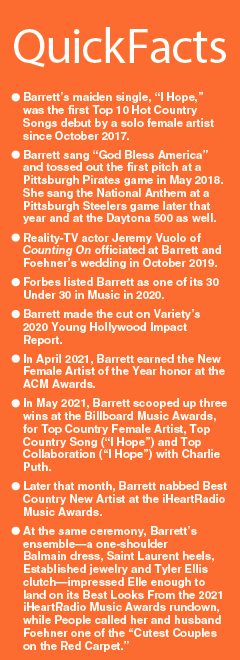
MC: How do you manage to maintain a private life in the social media era, and what’s the value you put on privacy?
Barrett: There’s a cost that comes with living in the spotlight when you sign up for it. People are naturally going to look into your life and be a part of it, and there’s nothing wrong with that. But it just depends on the person and how much they’re willing to share and how much they want to share. Being an open book is fine, but so is drawing boundaries. Not everything needs to be out in the spotlight.
There’s value in humans being made in the image of God. We have a right to not having to share our faith with the world. You have to work it out within your own family and on your own terms.
MC: Do you feel like female artists tend to get asked more about their children versus male artists?
Barrett: I really haven’t noticed that because my husband does interviews and gets asked about our daughter.
MC: You once mentioned that one of the fun parts of being a parent at this stage in your child’s life is seeing them discover which new foods they like or don’t like. Have you noticed anything this past week or two that Baylah May likes or doesn’t like?
Barrett: She doesn’t really like blueberries, which is funny. She’s just such a funny, interesting child. Yeah. And she’s really starting to talk a lot. She wants to crawl.
MC: Do you think you’re going to have many more children?
Barrett: You know, I’ll be grateful for that.
MC: Last question: In just about every interview I’ve read, you get asked what advice veteran artists have given you. And I’m wondering, given that you’ve already accomplished so much, what advice do you give young artists yourself?
Barrett: Use any negativity thrown at them and turn it into positivity. Don’t let it eat you up. Look at it as like fuel to the fire. Just keep one foot in front of the other. You’re going to get a lot of closed doors. But keep knocking. Eventually one of them is going to open.
Contact Jensen Sussman, [email protected]
Photos by Gus Black

